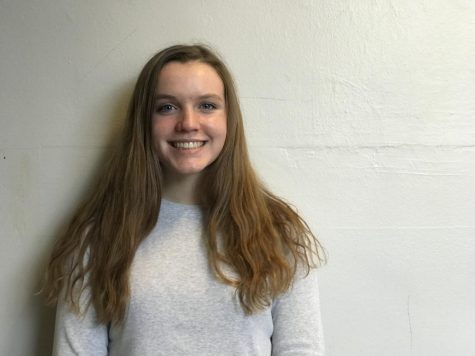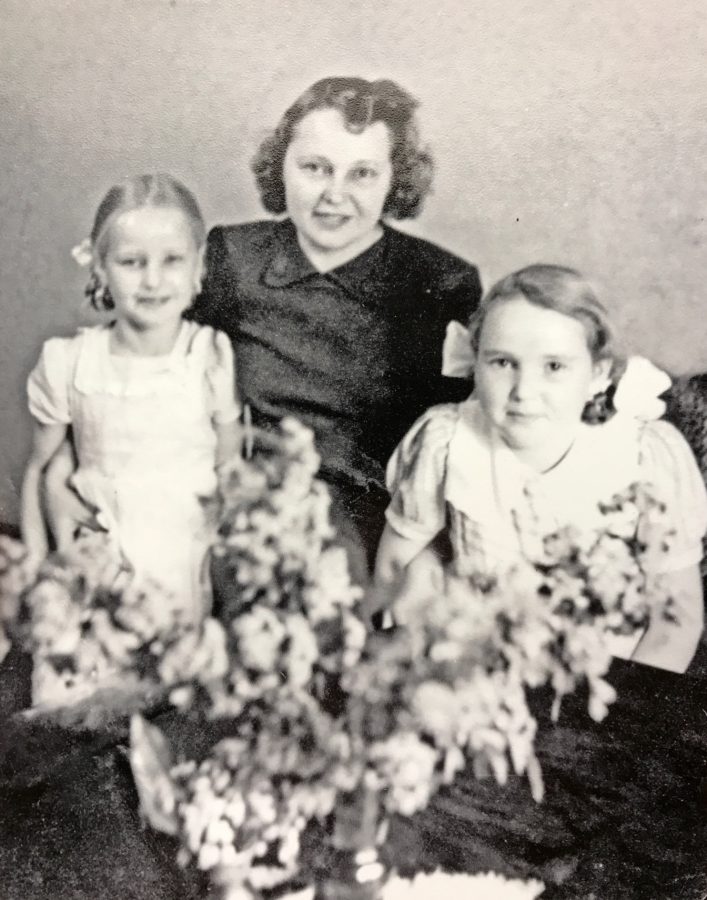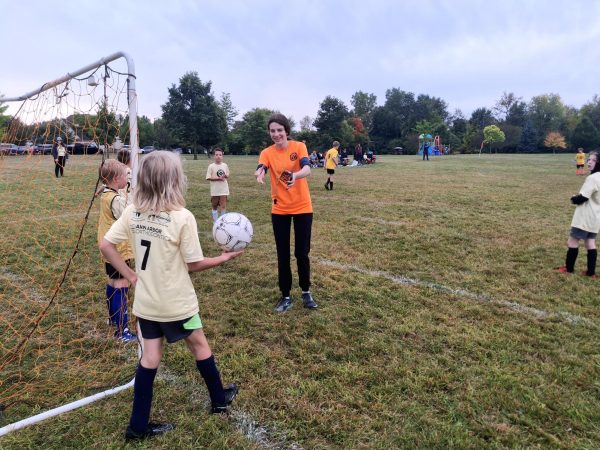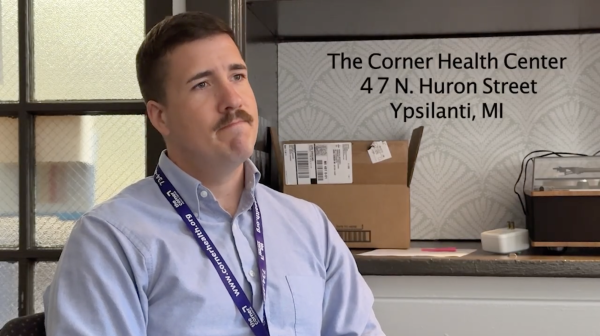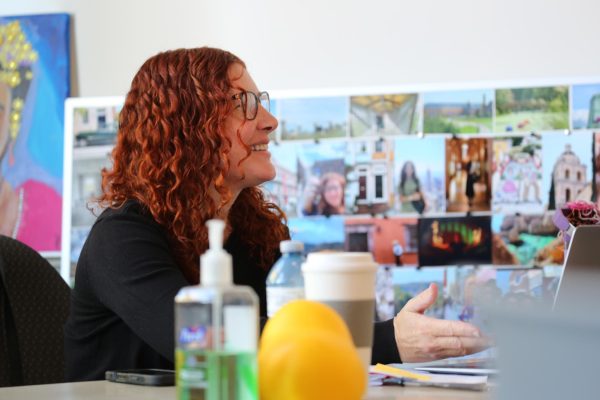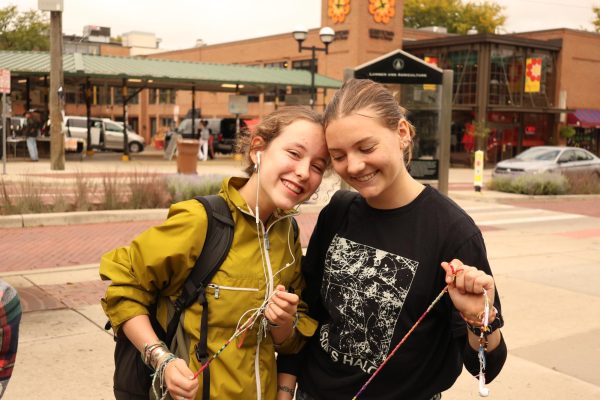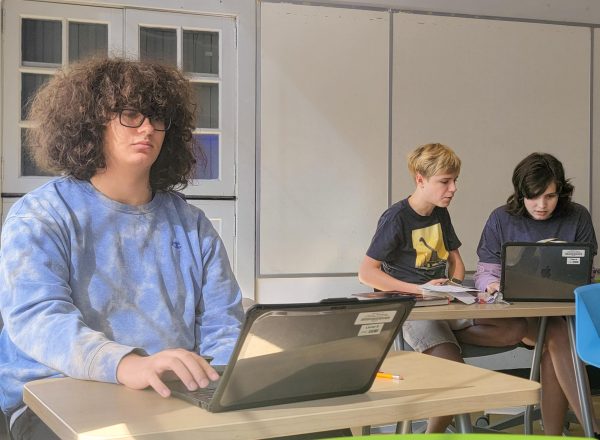A Refugee in a Different Time
When Mirdza Vitins was brought to a cafeteria her first day in the United States, she was struck with awe. “I hadn’t seen so much food for seven years,” Vitins said. She is a resident of Ann Arbor but is originally from Latvia.
Vitins is a refugee of World War II. She has traveled around the sun 104 times, and lived through both World Wars as they went on around her in Europe. She was born into a fairly well-off middle class family of intellectuals in Riga, the capital of Latvia.
She remembers the dark night of Jun. 14, 1941 when- in only a few hours- 15,500 Latvians were torn from their beds, loaded onto cattle cars and shipped to Siberia. Not even babies or the elderly were spared. Today, the path which those cattle cars took is lined with graves. “There was no food, and I think there was not even water,” Vitins said. “So babies were dying and old people were dying. They were thrown out on the side.”
By some stroke of luck, Vitins’s family was spared. They awoke the next day to find their neighbors, friends and relatives gone. Later, they learned that they were supposed to have been deported that night, but for a reason they will never know, they were overlooked.
At the beginning of World War II the Soviet Union invaded Latvia. “The Russian punks, without any warning, crossed our borders and went in,” Vitins said. “And our president was wise enough, what could we do?”
Under the Communist regime, everything that was once private was nationalized, including Vitins’s parents’ spacious apartment. Vitins’ family were all forced to move in together, along with four tenants. Although the apartment was large, it only had one bathroom. “Can you imagine all the people for one bathroom?” Vitins said. “It was quite terrible.”
Vitins worked at a scientific library in Riga, where she would spend her days surrounded by ancient, first edition books. Safely enclosed in the old library, as tensions between the Allies and Axis Powers grew around her, she worked on translating an extremely valuable series of German books, handwritten in the 19th century.
When Nazi Germany invaded, many Latvians saw it as a liberation. They didn’t know what horrors the Nazis had in store. They brought lemonade to the Nazi soldiers as they lied on the streets, exhausted from a night of fighting.
Meanwhile, her mother couldn’t sleep at all. All night she would be kept awake by the sound of the trucks rumbling through the streets, afraid that this would be the truck to take her away to the desolate tundra of Siberia. Vitins’s mother and Vitins’ young daughter, Aya, traveled to the countryside to her uncle’s farm, to escape the chaos of the city.
Even though they had been overlooked, Vitins and her husband were still afraid they were going to be deported. They tried to sleep somewhere different most nights. They slept in abandoned bars, at neighbor’s houses-wherever they could.
What was once the beautiful, vibrant city of Riga was completely transformed as the Germans and Russians fought.
One day in the summer, Vitins decided to go to a department store downtown to try to buy warm clothes in preparation for the possibility that they would be deported. It was useless; everything was sold out. The department store was empty. Suddenly, she heard gunfire erupt in the streets. Vitins remembers running out of the store and taking shelter in an apartment building.
She reached her head up to look out, and what she saw utterly shocked her. “The big St. Peter’s Church was in flames, that was the highest spire [in Riga],” Vitins said. “And it was burning. Oh, it was horrible!”
That day she walked through a main park in Central Riga – the equivalent of Central Park in New York City- on her way home. She had to sidestep all the trenches that had been dug during the fighting.
After one night of bombing by the Germans, Vitins came out onto a deserted street early in the morning. She remembers how quiet the city was. She saw pages blowing down the street. When she picked one up she saw that it was from a book in Latin, just like the books that were in her beloved library. Amidst the battle that night, her library had been set on fire, and all ofthose books were now ashes.
But not every book was lost. Her series of German books that she had painstakingly translated was hidden away in a bank safe.
On Jul. 1, the Soviet Occupation was officially over; Nazi Germany now had control of Latvia. By now, it was getting too dangerous to live in heavily populated areas. Vitins, her husband and her father decided to join the rest of her family on the farm. Unfortunately, most train bridges had been blown up, so they had to walk and hitchhike. Eventually they made it to the safe haven, which was the family farm, where they stayed until the fighting died down.
By 1942, it was safe to live in Riga again. During that year, her second daughter, Ieva, was born. They were given back ownership of their apartment in Riga, but resources were still scarce.
Then, in 1944, Vitins’s mother died. During that time, the German army was invading Russia, and things started to go poorly. The Germans were retreating and the Russians were advancing on Latvia. This worried the Vitins family. If the Russians took control again, they were certain they would be sent to the frozen tundra of Siberia.
As the Russian army got closer and closer to Latvia, Vitins’s husband decided to join a militia. “The Germans allowed a Latvian Legion, for Latvian men who wanted to fight against Russians, because [the Russians were responsible] for so many deported people,” Vitins said.
Vitins decided to separate from her husband and father who refused to leave Riga. She left for the safety of the country, once again, with her daughters in tow. “It was a very hard decision,” Vitins said.
During that summer, Vitins was on the beach, watching her daughters as they swam in the blue-green waters of the Baltic Sea, with a portable radio babbling in the background. Suddenly she heard an announcement: the last train leaving for Riga was embarking soon. After that, the bridge would be blown up, destroying her link back to her husband and father, and her home. She raced back to her uncle’s farm. “What to grab? We had to go to the station!” Vitins said. She packed only the necessities and rushed to the station. Itwas packed, full of people who believed the prospect of being separated from their families was worse than potential violence in Riga.
Vitins stayed in Riga with her husband for a few days. One night, he came home and told her that she had to leave on Aug. 5th. The German government was providing a boat that would send mostly women and children to a displaced persons camp in Germany.
On the boat, Vitins and her children were crammed into the haul, nestled in straw. Tensions were high as the boat made its way across the Baltic Sea, which was full of naval mines. “We somehow made it,” Vitins said.
In Germany, Vitins and her children stayed and survived through tough conditions. Every displaced person camp had little food, medical care, or any of the necessities.
They eventually were allowed to move to a little village in Germany, whose name translated to the “City of Flowers.” “There were no flowers, there were geese,” Vitins said. “Our family called it the Geese Village.” They stayed there for a year and a half. It was very hard on Vitins and her daughters. Food was scarce, like everywhere else. They were given few ration tickets which allowed her to get bread and milk for the children, but there was no source of protein available. “It was really a struggle, we were thinking everyday [about] what we were going to eat,” Vitins said.
After World War II ended, they moved to a displaced persons camp in Southern Germany. Vitins got a job in the main office of the camp. There was a kindergarten and elementary school for her daughters. There were even classes for all kinds of trades like weaving, ceramics and a drama school. “It was a life you could live, but we didn’t know what would happen the next day,” Vitins said.
In 1947, the displaced persons camp was getting emptier and emptier. People were emigrating to elsewhere like Canada, the United States and Australia to start their new lives. In August, Mirdza was taken in by a family in Grand Rapids, Michigan who had volunteered to sponsor refugee families from the war. Before they were able to immigrate to the United States they had to pass all the required tests. “Oh my god, weeks and weeks [of tests,]” Vitins said.
Once they were approved they were finally able to board a ship heading for the United States and their new life. Vitins remembers arriving in Grand Rapids like it was yesterday. “Oh it was a gray morning, it was two days after Thanksgiving,” Vitins said.
As Vitins and her daughters were driven through Grand Rapids, Vitins asked their sponsor family where the city was. To that they replied with a laugh that this was, in fact the city. Her sponsor family consisted of Margaret, a teacher, and Harold, a bookkeeper. They had three children and lived close to the school, which Vitins considered a luxury. “They were wonderful people, they were very nice,” Vitins said.
In 1952, Mirdza eventually moved to Ann Arbor once she got accepted to the University of Michigan, where she worked in the General Library for the University until her retirement.
Eight years earlier, in late 1944, the Russians conquered Latvia again and occupied it for the next 47 years. It was very hard to leave Latvia under the Soviet regime. Mirdza’s husband stayed in Latvia where he lived until his death in the 1990’s, never to be reunited with his family. With the other two Baltic countries of Lithuania and Estonia, Latvia gained its independence in 1991.
Aya and Ieva grew up in the United States, and both Vitins and her daughters were successfully granted citizenship to United States, all becoming contributing members of society. Vitins and her daughters have traveled back to Latvia numerous times. Although they have spent most of their life in the United States, they are all still strongly connected to their homeland.
